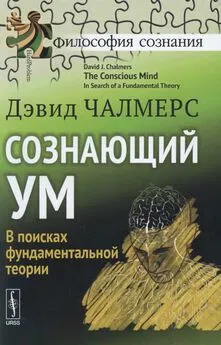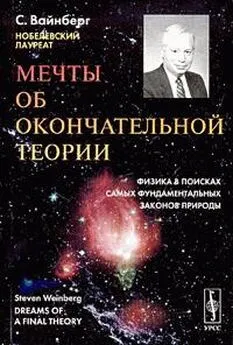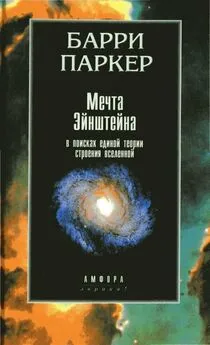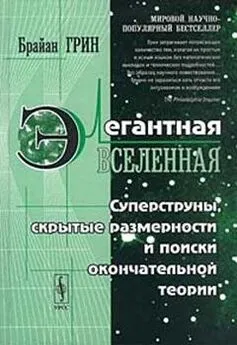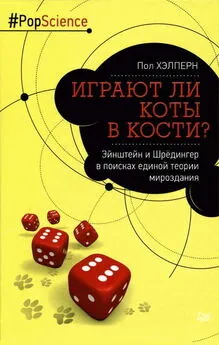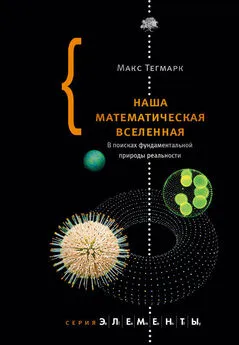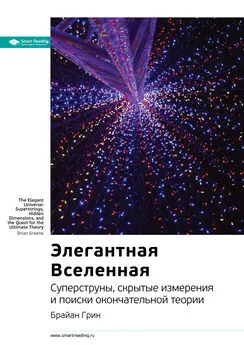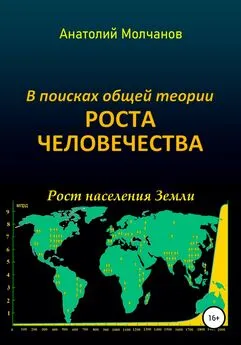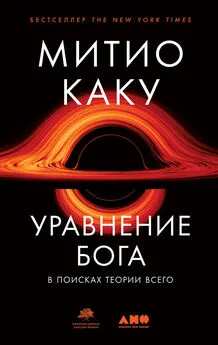Дэвид Чалмерс - Сознающий ум. В поисках фундаментальной теории
- Название:Сознающий ум. В поисках фундаментальной теории
- Автор:
- Жанр:
- Издательство:Книжный дом «ЛИБРОКОМ»
- Год:2013
- Город:Москва
- ISBN:ISBN 978-5-397-03778-5
- Рейтинг:
- Избранное:Добавить в избранное
-
Отзывы:
-
Ваша оценка:
Дэвид Чалмерс - Сознающий ум. В поисках фундаментальной теории краткое содержание
Эта книга, впервые опубликованная в 1996 году, стала одним из самых заметных философских трактатов конца XX века. В наши дни уже не удастся найти серьезных работ по проблеме сознания, в которых не было бы ссылок на Чалмерса.
«Сознающий ум» — увлекательный философский рассказ о глубочайших парадоксах и тайнах сознания. Это провокативная работа, в которой сделана попытка обосновать «натуралистический дуализм», исходя из тезиса автора о нефизической природе сознания и его зависимости от функциональных схем в мозге. Чалмерс также утверждает, что его теория открывает новые перспективы для интерпретации квантовой механики и позволяет говорить о возможности сознательных роботов.
Ясность изложения, смелость идей, изобретательность мысленных экспериментов, точность рассуждений и широкая эрудиция автора делают эту книгу настоящим подарком для всех, кто интересуется философией.
Сознающий ум. В поисках фундаментальной теории - читать онлайн бесплатно полную версию (весь текст целиком)
Интервал:
Закладка:
1990. The intrinsic quality of experience. Philosophical Perspectives 4:31–52.
Hamad S. 1989. Minds, machines and Searle. Journal of Experimental and Theoretical Artificial Intelligence 1:5-25.
Harrison B. 1967. On describing colors. Inquiry 10:38–52. 1973. Form and Content. Oxford: Blackwell.
1973. Form and Content. Oxford: Blackwell.
Harrison J. 1981a. Three philosophical fairy stories. Ratio 23:63–67.
1981b. Gulliver’s adventures in Fairyland. Ratio 23:158-64.
Haugeland J. 1980. Programs, causal powers, and intentionality. Behavioral and Brain Sciences 4:432-33.
1982. Weak supervenience. American Philosophical Quarterly 19:93-103.
Healey R. A. 1984. How many worlds? Nous 18:591–616.
Heil J. 1992. The Nature of True Minds. Cambridge: Cambridge University Press.
Heilman G.,and F. Thompson. 1975. Physicalism: Ontology, determination and reduction. Journal of Philosophy 72:551-64.
Hill C. S. 1991. Sensations: A Defense of Type Materialism. Cambridge: Cambridge University Press.
Hodg^on D. 1988. The Mind Matters: Consciousness and Choice in a Quantum World. Oxford: Oxford University Press.
Hofstadter D. R. 1979. Gуdel, Escher, Bach: an Eternal Golden Braid. New York: Basic Books.
1981. Reflections on Searle. In D. R. Hofstadter and D. C. Dennett, eds., The Mind’s I.
New York: Basic Books.
1985a. Who shoves whom around inside the careenium? In Metamagical Themas. New
York: Basic Books. 1985b. Heisenberg’s Uncertainty Principle and the many‑worlds interpretation of quantum mechanics. In Metamagical Themas. New York: Basic Books.
Honderich T. 1981. Psychophysical law‑like connections and their problems. Inquiry 24:277–303.
Horgan T. 1978. Supervenient bridge laws. Philosophy of Science 45:227-49.
1982. Supervenience and microphysics. Pacific Philosophical Quarterly 63: 29–43.
1984a. Functionalism, qualia, and the inverted spectrum. Philosophy and Phenomenological Research 44:453-69.
1984b. Jackson on physical information and qualia. Philosophical Quarterly 34:147-83.
1984c. Supervenience and cosmic hermeneutics. Southern Journal of Philosophy , suppl.,
22:19–38.
1987. Supervenient qualia. Philosophical Review 96:491–520.
1993. From supervenience to superdupervenience: Meeting the demands of a material
world. Mind 102:555-86.
Horgan T ., and M. Timmons. 1992a. Troubles for new wave moral semantics: The «open question argument» revived. Philosophical Papers.
1992b. Trouble on moral twin earth: Moral queemess revived. Synthese 92:223-60.
Horst S. 1995. Phenomenology and psychophysics. Manuscript, Wesleyan University.
Hughes R. I. G. 1989. The Structure and Interpretation of Quantum Mechanics. Cambridge, Mass.: Harvard University Press.
Humphrey N. 1992. A History of the Mind: Evolution and the Birth of Consciousness. New York: Simon and Schuster.
Huxley T. 1874. On the hypothesis that animals are automata. In Collected Essays. London, 1893–1894.
Jackendoff R. 1987. Consciousness and the Computational Mind. Cambridge, Mass.: MIT Press.
Jackson F. 1977. Perception. Cambridge: Cambridge University Press.
1980. A note on physicalism and heat. Australasian Journal of Philosophy 58:26–34.
1982. Epiphenomenal qualia. Philosophical Quarterly 32:127-36.
1993. Armchair metaphysics. In J. O’Leary‑Hawthorne and M. Michael, eds., Philosophy
in Mind. Dordrecht: Kluwer.
1994. Finding the mind in the natural world. In R. Casati, B. Smith, and G. White,
eds., Philosophy and the Cognitive Sciences , Vienna: Holder‑Pichler‑Tempsky.
1995. Postscript to «What Mary didn’t know.» In P. K. Moser and J. D. Trout, eds.,
Contemporary Materialism. London: Routledge.
Jacoby H. 1990. Empirical functionalism and conceivability arguments. Philosophical Psychology 2:271-82.
Jaynes J. 1976. The Origins of Consciousness in the Breakdown of the Bicameral Mind. Boston: Houghton Mifflin.
Johnson‑Laird P. 1983. A computational analysis of consciousness. Cognition and Brain Theory 6:499–508.
Kaplan D. 1979. Dthat. In P. Cole, ed., Syntax and Semantics. New York: Academic Press.
1989. Demonstratives. In J. Almog, J. Perry, and H. Wettstein, ed., Themes from Kaplan.
NewYork: Oxford University Press.
Kim J. 1978. Supervenience and nomological incommensurables. American Philosophical Quarterly 15:149-56.
1984. Concepts of supervenience. Philosophy and Phenomenological Research 45:153-76.
1985. Psychophysical laws. In B. McLaughlin and E. LePore, eds., Action and Events.
Oxford: Blackwell.
1989. Mechanism, purpose, and explanatory exclusion. Philosophical Perspectives
3:77-108.
1993. Supervenience and Mind. Cambridge: Cambridge University Press.
Kirk R. 1974. Zombies versus materialists. Aristotelian Society 48(suppl.): 135-52.
1979. From physical explicability to full‑blooded materialism. Philosophical Quarterly
29:229-37.
1992. Consciousness and concepts. Proceedings of the Aristotelian Society 66(suppl.):23–40.
1994. Raw Feeling: A Philosophical Account of the Essence of Consciousness. Oxford:
Oxford University Press.
Korb K. 1991. Searle’s AI program. Journal of Experimental and Theoretical Artificial Intelligence 3:283-96.
Kripke S. A. 1971. Identity and necessity. In M. Munitz, ed., Identity and Individuation. New York: New York University Press.
1972. Naming and necessity. In G. Harman and D. Davidson, eds., The Semantics of
Natural Language. Dordrecht: Reidel. [Reprinted as Kripke 1980]
1980. Naming and Necessity. Cambridge, Mass.: Harvard University Press.
1982. Wittgenstein on Rule‑Following and Private Language. Cambridge, Mass.: Harvard University Press.
Lahav R., and N. Shanks. 1992. How to be a scientifically respectable «property dualist.» Journal of Mind and Behavior 13:211-32.
Langton C. G. 1989. Artificial Life: The Proceedings of an Interdisciplinary Workshop on the Synthesis and Simulation of Living Systems. Redwood City, Calif.: Addison‑Wesley.
Leckey M. 1993. The universe as a computer: A model for prespace metaphysics. Manuscript. Philosophy Department, Monash University.
Levine J. 1983. Materialism and qualia: The explanatory gap. Pacific Philosophical Quarterly 64:354-61.
1988. Absent and inverted qualia revisited. Mind and Language 3:271-87.
1991. Cool red. Philosophical Psychology 4:27–40.
1993. On leaving out what it’s like. In M. Davies and G. Humphreys, eds., Consciousness: Psychological and Philosophical Essays. Oxford: Blackwell.
Lewis D. 1966. An argument for the identity theory. Journal of Philosophy 63:17–25.
1972. Psychophysical and theoretical identifications. Australasian Journal of Philosophy
50:249-58.
1973. Counterfactuals. Cambridge, Mass.: Harvard University Press.
1974. Radical interpretation. Synthese 23:331-44.
1979. Attitudes de dicto and de se. Philosophical Review 88:513-45.
1983a. Extrinsic properties. Philosophical Studies 44:197-200
1983b. New work for a theory of universals. Australasian Journal of Philosophy 61:343-77.
1986a. On the Plurality of Worlds. Oxford: Blackwell.
1986b. Philosophical Papers. Vol. 2. New York: Oxford University Press.
1990. What experience teaches. In W. Lycan, ed., Mind and Cognition. Oxford: Blackwell.
1994. Reduction of mind. In S. Guttenplan, ed., A Companion to the Philosophy of Mind.
Oxford: Blackwell.
Libet B. 1993. The neural time factor in conscious and unconscious events. In Experimental and Theoretical Studies of Consciousness. Ciba Foundation Symposium 174. New York: Wiley.
Loar В. 1990. Phenomenal states. Philosophical Perspectives 4:81-108.
Lockwood M. 1989. Mind, Brain, and the Quantum. Oxford: Blackwell.
1992. The grain problem. In H. Robinson, ed., Objections to Physicalism. Oxford:
Oxford University Press.
Logothetis N., and J. D. Schall. 1989. Neuronal correlates of subjective visual perception. Science 245:761-63.
London F., and E. Bauer. 1939. The theory of observation in quantum mechanics (in French). Actualitйs scientifiques et industrielles, no. 775. [English translation in Wheeler and Zurek 1983]
Lucas J. R. 1961. Minds, machines and Gуdel. Philosophy 36:112-27.
Lycan W. G. 1973. Inverted spectrum. Ratio 15:315-19
1987. Consciousness. Cambridge, Mass.: MIT Press.
1995. A limited defense of phenomenal information. In T. Metzinger, ed., Conscious
Experience. Paderbom: Schуningh.
1996. Consciousness and Experience. Cambridge, Mass.: MIT Press.
Mackay D. M. 1969. Information, Mechanism, and Meaning. Cambridge, Mass.: MIT Press.
Mackie J. L. 1974. The Cement of the Universe. Oxford: Oxford University Press.
1977. Ethics: Inventing Right and Wrong. Harmondsworth: Penguin Books.
Marks L. E. 1978. The Unity of the Senses: Interrelations among the Modalities. New York: Academic Press.
Matzke /)., ed. 1993. Proceedings of the 1992 Workshop on Physics and Computation. Los Alamitos, Calif.: IEEE Computer Society Press.
Читать дальшеИнтервал:
Закладка:
